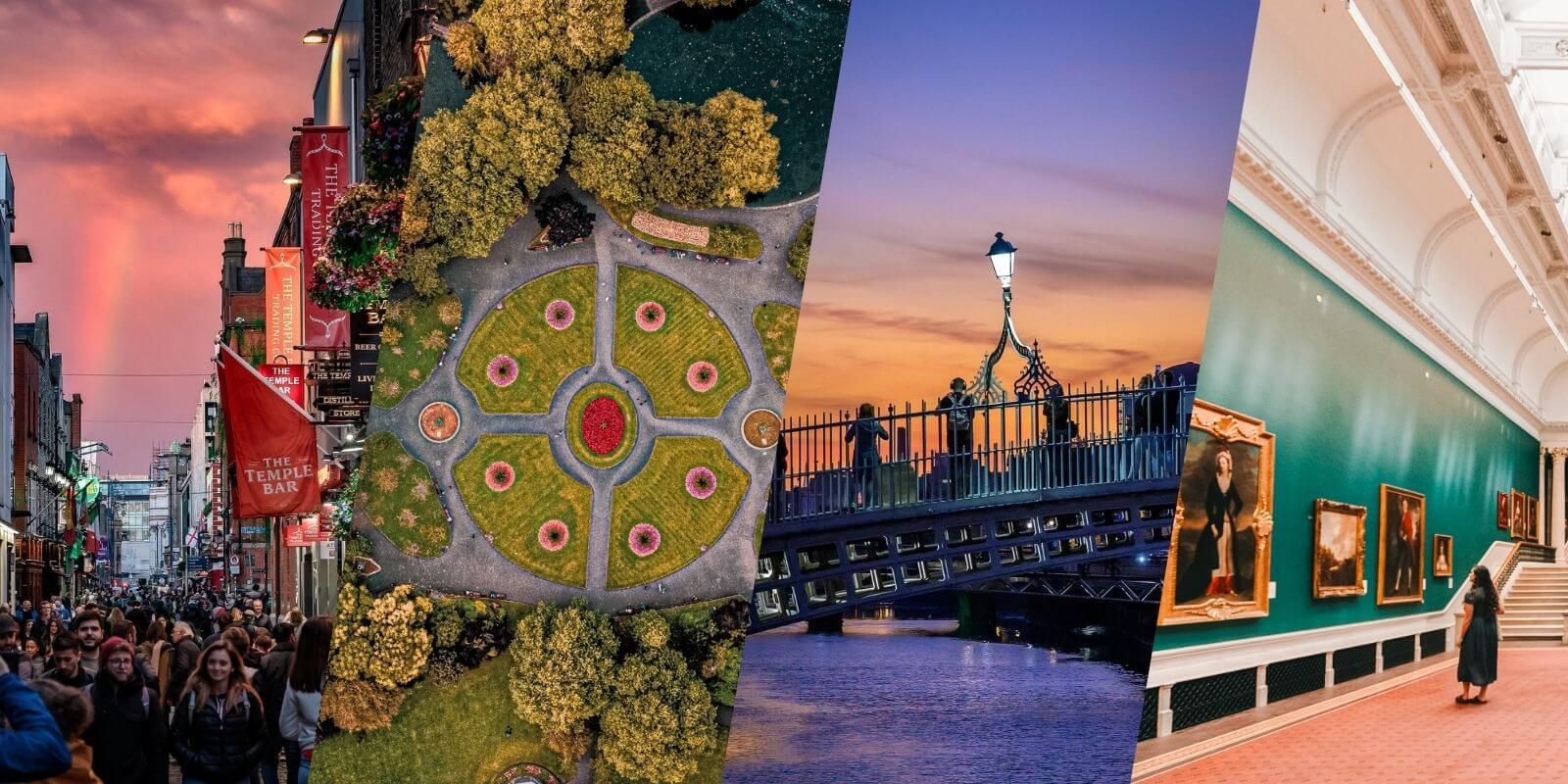Exchange in Ireland: Everything you need to know to study, live and work in Dublin as an international student
-
Study and Work with Stamp 2 Visa: International students can study English in Ireland for at least 25 weeks and legally work up to 20 hours per week during the course and up to 40 hours per week during holiday periods. There’s no need to apply for your visa before arriving in Ireland — simply come with all required documents and book your Irish Residence Permit (IRP) appointment once you’re in Dublin.
-
Student Accommodation and Affordable Living in Dublin: Dublin’s housing market is challenging, so it’s best to start with temporary accommodation. Hostels like Gardiner House and Garden Lane Backpackers offer affordable, social options with discounts for longer stays. To find more permanent housing, platforms like Daft.ie and Facebook groups are great tools for discovering rooms and apartments.
-
Working and Living Legally in Ireland: To work legally, you’ll need to apply for a PPS Number (like a social security or tax number) and open a local bank account. There are plenty of job opportunities in cafés, retail, cleaning and restaurants. Have a ready European-style CV and begin your job search early on popular websites like Indeed and Jobs.ie.
Planning to Study English, Work Legally and Live an Amazing Experience Abroad? Studying abroad in Ireland is a top choice for exchange students worldwide, especially in Dublin. However, before you embark on this exciting journey, it’s important to understand everything involved with studying, living and working in Ireland under a student visa.
This updated, comprehensive guide will answer your most common questions and walk you through, step-by-step, everything you need to know to prepare for your student exchange in Ireland safely and confidently in 2025.
Do You Need a Visa to Study and Work in Ireland?
Yes, many international students need a Student Visa (Stamp 2) to study and work legally in Ireland. The great news is you don’t have to apply for this visa before arriving in Ireland. When you arrive at the Irish airport, you enter as a tourist and have up to 90 days to get your paperwork in order and register for the Irish Residence Permit (IRP) in Dublin.
What Can You Do with the Stamp 2 Visa?
-
Study English in an approved course for at least 25 weeks
-
Work up to 20 hours per week during classes
-
Work up to 40 hours per week during official holiday periods (June to September and December 15 to January 15)
Documents Required When You Arrive in Ireland:
-
Proof of course payment (minimum 25 weeks)
-
Valid private health insurance
-
Proof of funds (minimum €4,500, required amount may vary)
-
Return travel ticket
-
Proof of temporary accommodation (such as a hostel or school-arranged housing)
Choosing the Best English School in Dublin for You
Ireland has dozens of schools accredited on the Interim List of Eligible Programmes (ILEP), ensuring they meet the government’s requirements for international students. Choosing the right school is essential as it can affect both your visa and your overall experience.
What to Consider When Choosing Your School:
-
Location (city centre or nearby neighbourhoods)
-
Facilities and teaching methods
-
Flexibility of class schedules
-
Reviews and opinions from former students
-
Promotions and agency partnerships
Tip: Research online on Google, Instagram and Facebook groups or nationality-specific groups to see what current students say about schools. This helps a lot!
Visa Interview: How to Book Yours?
To study and work in Ireland, you need to enrol in an English course lasting at least 25 weeks with 8 weeks holiday. Upon arrival, immigration officers will ask for proof of course payment and health insurance.
You will initially get a temporary visa but will need to obtain the study visa (Stamp 2), which allows you to study and work.
You must book an interview with immigration to get your IRP (Irish Residence Permit), the card that proves your legal stay. Schedule your interview as soon as possible through the Burgh Quay website. Try to book even before arriving in Ireland. Demand is high, so check every morning for available slots.
-
The interview is conducted online via the Burgh Quay site.
-
Slots are limited, so check daily in the mornings.
-
On interview day, bring all the required documents.
Tip: The sooner you book, the better! Some get appointments within days, others may wait weeks. Keep checking regularly!
Where to Live in Dublin? Student Accommodation Options
Dublin is facing a serious housing crisis, making it quite challenging for international students to find accommodation. So, planning your stay while still in your home country is essential. The city’s rental market is very competitive, so it’s best to start with reliable temporary accommodation for your first few days or weeks.
Hostels are a great option: they are cheaper, friendly, social and perfect for meeting other students who are also new to life in Ireland.
When looking for permanent housing, consider location carefully. Living in the city centre costs more but saves you on public transport. Use sites like Daft.ie and Facebook groups to find rooms or apartments.
Common student accommodation options include:
-
Hostels with monthly plans (ideal for arrivals and first weeks)
-
Shared flats or rooms (cheaper outside the centre)
-
Student residences (higher prices but full facilities)
-
Homestays (family homes, great for practising English)
Tip: Canbe Hostels (Gardiner House Hostel & Garden Lane Backpackers) offer special weekly discounts for stays of 4 weeks or more. It’s an economical and welcoming way to start your journey in Dublin.
Which Mobile SIM Should You Choose in Ireland?
Having a local SIM card makes a huge difference for maps, internet access and staying connected. The operator Three offers a prepaid plan with unlimited internet for just €20 per month.
Popular mobile providers include:
-
Lycamobile (great for cheap international calls)
You can buy SIM cards in official stores or in convenience shops like Spar and Centra. Simply insert it into your phone, activate the plan and you're good to go!
Getting a Job in Dublin as an International Student
Want to work while studying in Ireland? Good news: it’s possible and common! With the Stamp 2 visa, students are legally allowed to work up to 20 hours per week during term time and up to 40 hours per week during holidays. This helps cover living costs in Dublin and is a great way to practice English, network and experience Irish culture.
Start job hunting as soon as you have your PPS number (more on that below). Most international students get their first jobs in accessible roles such as:
-
Cafés and restaurants (barista, kitchen porter, waiter/waitress)
-
Shops (retail assistant)
-
Cleaning or housekeeping
-
Stock assistants in supermarkets
Useful job search platforms for Ireland include Indeed, Jobs.ie, LinkedIn and Facebook groups dedicated to foreigners looking for jobs.
Pro tip: Have a European-style CV — short, clear and to the point. Include previous experience (even from your home country), your English level and your availability.
PPS Number: What It Is and How to Get One
The PPS Number (Personal Public Service Number) is essential for anyone wanting to live legally in Ireland. It acts as a unique national identification number for residents and is required for working, opening a bank account, paying taxes and accessing public services such as healthcare.
How to Apply for Your PPS Number
You need to follow a few steps:
-
Have a fixed address in Dublin
-
Receive a letter from your employer with a job offer
-
Register on the official MyWelfare website
-
Book your interview online
For the appointment, bring these documents:
-
Passport
-
School enrolment letter
-
Proof of address
-
Employer’s letter
Tip: Many students get their PPS soon after securing a temporary job, so be proactive with your CV and start looking for jobs early.
Opening Your Irish Bank Account as an International Student in Dublin
Once you have a job in Dublin, the next step is to open a bank account to receive your salary safely and avoid international fees. The most popular banks for international students are AIB and Bank of Ireland, both reputable and with branches all over the city.
To open an account in these traditional banks, you usually need to book an in-person appointment due to high demand and limited immediate availability. Branches outside central Dublin often have shorter queues and may open accounts on the same day.
On the appointment day, bring all required documents: passport (or EU ID card), PPS Number and proof of address such as a utility bill or official letter from your school or government. After submitting your paperwork, the bank may take up to five working days to process your application and send your debit card to your home.
Faster and More Convenient Alternatives: For a quicker, more practical option, consider digital banks like Revolut or N26. These are very popular among exchange students for their fully online account opening process, instant virtual cards and European IBAN numbers.
Cost of Living in Dublin
Dublin is an amazing, modern city full of history, culture and opportunities. However, it is also known for having one of the highest costs of living in Europe, especially when it comes to housing. Still, with careful planning and smart choices, it’s completely possible to live well on a student budget.
One important thing to highlight is that the biggest expenses usually happen in the first few days after arriving. This is when you need to sort out everything at once: paying your first month’s rent, deposit, buying food, spices, kitchen utensils, blankets, pillows, bedding, towels, warm clothes suitable for Ireland’s weather (because the ones we often bring from other countries usually aren’t enough for the wind and rain here) and other essential daily items.
These initial expenses are not counted in the financial proof required by the Irish government and this is very important. The amount you need to prove at immigration must remain untouched until your IRP (Irish Residence Permit) appointment. In other words, the money you plan to spend on these first costs needs to be set aside and budgeted separately.
Average Monthly Expenses (2025):
-
Rent (shared room in the city centre): €500–€800
-
Rent (private room in the city centre): €800–€1200
-
Food: €200–€300
-
Weekly public transport (Student Leap Card): €12
-
Weekly public transport (Adult Leap Card): €24
-
Mobile phone plan: €20
-
Leisure and extras: €100–€200
Of course, these amounts can vary widely depending on your lifestyle, location and whether you share costs with others. Those who choose to live a little further from the centre can find cheaper rent but should also consider the cost and time of travel. It really depends on individual priorities and routines.
Financial Planning Is Key! Having a clear idea of the costs of living in Dublin as a student and planning for your initial expenses upon arrival can save you a lot of hassle. It helps ensure a smoother and more organised experience.
Extra Tips for Your Experience in Ireland
Besides studying and working, an exchange in Ireland is a unique opportunity to explore, make friends and experience new cultures.
Here are some valuable tips:
-
Learn a bit about Irish culture: traditional music, pubs, weather and common expressions
-
Make friends from different countries to expand your network
-
Explore Ireland: weekend trips to cities like Galway, Cork, Limerick and Belfast are a must
-
Take advantage of school holidays to visit other European countries with cheap flights out of Dublin
And to top it all off: this exchange in Ireland is much more than just studying English or getting a part-time job. It’s a chance for personal, cultural and professional growth that can change your future. Imagine living in a much safer country (compared to many countries), making friends from all over the world, practising your English every day in pubs and cafés, discovering incredible landscapes on weekends and building a financial foundation to follow your dreams.
Start planning your journey today. Dublin is waiting for you!
🎇 Stay At Canbe Hostels 🎇



